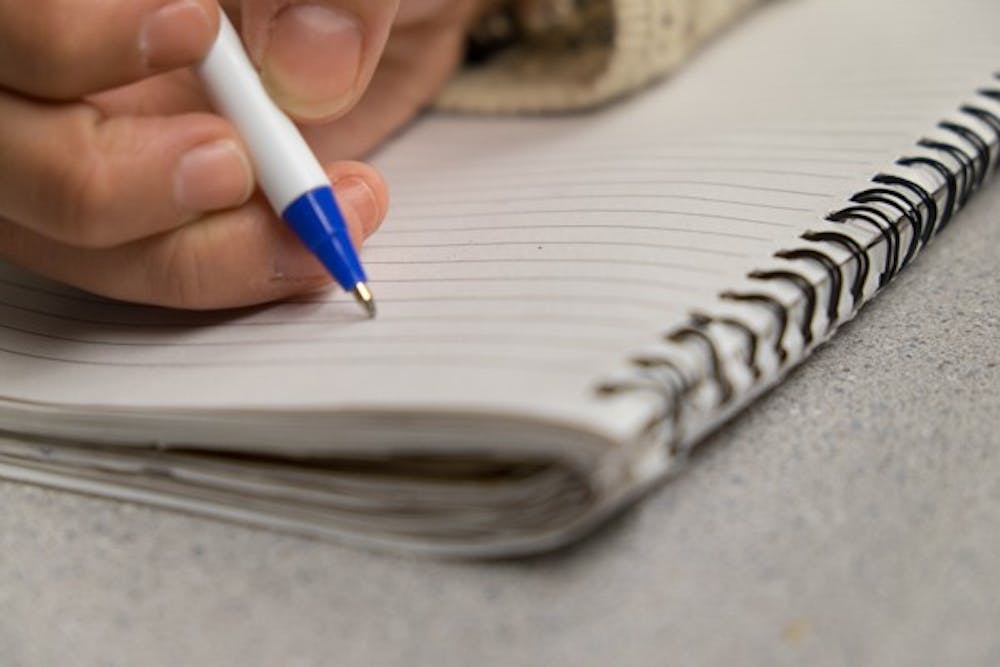Numerous ASU professors are encouraging students to take handwritten notes in lieu of electronic notes. A study showed that students who write notes by hand do better on exams. (Photo illustration by Andrew Ybanez)
Using technology in the classroom has become a popular method of note taking, especially with college students.
However, recent studies show that when it comes to note taking, it is better to keep it old school.
Various ASU students said, unlike previous years, more of their professors are encouraging them to handwrite their notes or are forbidding laptop use altogether.
Education junior Yarima Morfin said she always took notes on the computer until this year when one off her professors did not allow it.
“I noticed it makes me totally more organized,” Morfin said. “It forces me to be concise, because I cannot write fast enough. I also noticed that when I handwrite my notes, I do better on exams, because I remembered more of the information that way.”
According to a study published earlier this year in Psychology Science, “The Pen is Mightier Than the Keyboard,” students who take handwritten notes retain more information and do better on exams.
Daniel Oppenheimer, one of the two psychologists who wrote the study, said this is because students process the information more deeply when handwriting.
For the study, the researchers showed college students videos of lectures and randomly assigned them to take notes either by hand or by laptop, Oppenheimer said.
The students who took notes on the laptop wrote word-for-word what the lectures were saying, but processed and retained the information less effectively.
“While there were no differences between conditions on memory for basic facts, handwriting led to better performance on conceptual knowledge,” Oppenheimer said. “When handwriting, they had to listen to the lecture, understand what was important to write down, and summarize in their own words. This led to deeper processing and better conceptual understanding.”
Cara McDaniel, economics professor at ASU, said she advises her students to take notes by hand instead of on a laptop because of this study.
McDaniel said she leaves blanks in her lectures so that students are encouraged to print out the slides and fill in the missing material by hand during class.
“Students have reported to me that they do better when they print out the slides and handwrite their notes,” McDaniel said. “The students who usually do poorly on exams have reported to me that they have a tendency to use a laptop for notes.”
Communications senior Anastasia Weiss said she usually writes all of her notes by hand.
“I feel I learn more when I actually write it out,” Weiss said. “I have a hard time remembering stuff if I don’t write it down, and I feel like it’s a lot more effective for me personally.”
Part of the problem with laptops in class is that students can become distracted, McDaniel said. However, even if a student pays perfect attention on a laptop, they still wouldn’t retain the information as much McDaniel said.
In big lecture halls where the challenge is reaching every student in the class, McDaniel said she eventually wants to find a method that is effective but also requires students to hand write all of their notes.
Biomedical engineering junior Vivian Vuong said she tends to take notes on a laptop.
“When you’re in a lecture, the teacher is talking very quickly and going through the material, so it’s easier for me to write down everything they say so I don’t miss any key information,” Vuong said. “It’s better to have all of the information than to miss something or misunderstand a topic.”
This method has its drawbacks, Vuong said. When doing homework and studying, she has to revisit everything that she typed.
“If I’m studying for an exam, I have to go back and handwrite the notes that I took on the computer, because it helps me remember the key information better that way,” Vuong said. "But I don't think it matters which method you use; it's more about your study habits afterwards and how much time you put into learning the material."
Reach the reporter at bjohns35@asu.edu or follow her on Twitter @JayEerb
Like The State Press on Facebook and follow @statepress on Twitter





